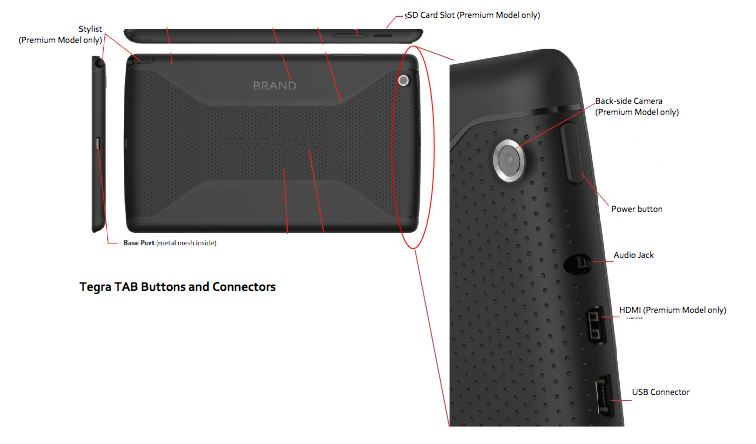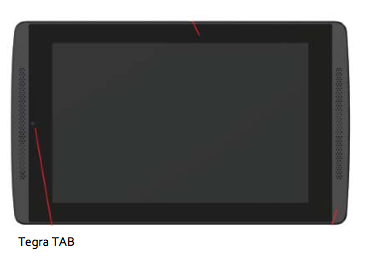Nvidia Tegra Tab Specs Leaked via FCC Documents
Yet more details of Nvidia's Tegra Tab emerge, this time courtesy of the FCC.
The last couple of weeks have been rife with rumors of an Nvidia tablet powered by Tegra 4. Most recently, the device showed up in photos leaked by Taiwan's version of the FCC. Less than a week later, the tablet is showing up at the FCC for real.
The FFC filing reveals specs for a device labeled Tegra TAB as well as photos of the 7-inch tablet and a user manual. The user manual reveals that the Tegra TAB, available in Basic and Premium models, will run Android Jelly Bean as its operating system. The premium model will have a 5-megapixel rear-facing camera, microSD slot and stylus, features which won't be present on the basic model. Premium specs aside, you're looking at a front-facing camera, support for micro HDMI, WiFi, Bluetooth, NFC, a micro USB port for charging, a 7-inch 1280 x 800 IPS display, and a 3200 or 4100 mAh battery powering the whole show.
These specs match up with previously discussed specifications which includes a 5-megapixel camera, a front-facing camera on the front, micro USB port, a micro HDMI port, and support for microSD TransFlash memory cards. No word on a release date or pricing, and Nvidia didn't have the tablet on show at IFA in Berlin. It'ss possible Nvidia still wants to get this device to market in time for the holiday shopping season, in which case we should see an announcement in the coming weeks. Stay tuned!
Follow Jane McEntegart @JaneMcEntegart. Follow us @tomshardware, on Facebook and on Google+.
Get Tom's Hardware's best news and in-depth reviews, straight to your inbox.

Jane McEntegart is a writer, editor, and marketing communications professional with 17 years of experience in the technology industry. She has written about a wide range of technology topics, including smartphones, tablets, and game consoles. Her articles have been published in Tom's Guide, Tom's Hardware, MobileSyrup, and Edge Up.
-
chumly Am I the only one who feels like Android is a step in the wrong direction? It's a PHONE OS. It simply cannot do what Windows does (or even Apple OS for that matter) as far as what I personally want from a device in terms of performance capability and security.Reply
nVidia is not competing with a market, they're buying into it. With all of the AMAZING things they can do with graphics, it surprises me that they're willing to build on a platform that is 10 years in the past. -
teh_chem The forward-firing speakers are literally the only thing I care much about in this device. Otherwise it's not really any better (or worse) than other tablets you can already get. Nvida is going to need some mega-marketing or some uber-competitive pricing for this to gain much traction, since the tablet market is already pretty competitive and chock full of device options.Reply -
teh_chem Reply
What are you expecting in terms of performance capability and security?11508521 said:Am I the only one who feels like Android is a step in the wrong direction? It's a PHONE OS. It simply cannot do what Windows does (or even Apple OS for that matter) as far as what I personally want from a device in terms of performance capability and security.
nVidia is not competing with a market, they're buying into it. With all of the AMAZING things they can do with graphics, it surprises me that they're willing to build on a platform that is 10 years in the past.
Android's advantage is its vulnerability--a "free" and "open" (yes, in quotes for a reason--it's neither free nor totally open) OS that "anyone" can put on a device. You're not locked into one device manufacturer, so it properly fosters competition. On the other hand, you're at the mercy of whomever you get your device from, and no one is really making any efforts for equal user experience or security across the entire "android" platform. But I would not call it any less secure or incapable of delivering performance than iOS. On the contrary, I think 4.1+ is quite a bit ahead of iOS in very many areas.
Relative to windows tablets, which are more-tuned for productivity, android faulters. While they can be used for taking notes and composing documents, most android tablets have horrible user experiences for productivity. Google Doc's (Drive) is actually pretty good for document creation and editing, but it still requires an internet connection on Android. But I don't think android tablets are typically marketed as productivity devices, so those who buy them are already knowledgeable of this point, and generally use them as mobile media consumption/entertainment devices.
Though I didn't buy one, I'm hopeful for the next revisions of MS's surface tablets. I think bay trail atoms will be a great addition to this space, and I think Surface RT (if it does get a refresh), will benefit greatly from the improved SoC's after Tegra3 (which was another lackluster release). I think Surface can be the proper marriage of entertainment/media as well as productivity. Just get rid of that dumb goddamn kickstand and magnetic base attachment, and get a proper docking keyboard with a secondary battery. -
Solandri Reply
Android is Linux. A cut-down version of Linux with an even more restrictive GUI, but it's Linux. If you grab a terminal emulator app from the Play store, you can get a Linux command prompt with most of the Unix command line tools available.11508521 said:Am I the only one who feels like Android is a step in the wrong direction? It's a PHONE OS. It simply cannot do what Windows does (or even Apple OS for that matter) as far as what I personally want from a device in terms of performance capability and security.
So conceivably, with some work, Android can do anything Linux can do. Which is a whole lot more than what iOS or even Windows can do. For that reason I think it's a good choice for the future. As phone processors become faster and more sophisticated, the huge library of open source Linux tools could eventually be ported to Android. (Course we need GCC to be ported first...) -
chumly Reply11508775 said:
Android is Linux. A cut-down version of Linux with an even more restrictive GUI, but it's Linux. If you grab a terminal emulator app from the Play store, you can get a Linux command prompt with most of the Unix command line tools available.11508521 said:Am I the only one who feels like Android is a step in the wrong direction? It's a PHONE OS. It simply cannot do what Windows does (or even Apple OS for that matter) as far as what I personally want from a device in terms of performance capability and security.
So conceivably, with some work, Android can do anything Linux can do. Which is a whole lot more than what iOS or even Windows can do. For that reason I think it's a good choice for the future. As phone processors become faster and more sophisticated, the huge library of open source Linux tools could eventually be ported to Android. (Course we need GCC to be ported first...)
...and this is why everyone uses Linux. Right? Oh wait... No one uses Linux. And it's FREE. What's that tell you about Linux? "With some work" doesn't do anything for me right now. -
teh_chem Reply11510011 said:...and this is why everyone uses Linux. Right? Oh wait... No one uses Linux. And it's FREE. What's that tell you about Linux? "With some work" doesn't do anything for me right now.
To be fair, most people don't use linux because it isn't pushed in their face with the purchase of every personal computer since the 80's like Windows was. Most people don't "pay" for windows (though technically the cost of the OS is built into the sale price of a computer)--psychologically, it's just as "free" as if they had linux.
Regardless, this android = linux statement is horribly overblown. Android is android. It has its own code and libraries (separate from core linux--Google has its own proprietary code in android that it retains as proprietary and does not make available under "open" platform ideals). It also has its own support and app/development ecosystem. Having used linux to build it doesn't equate it to linux, and linux's qualities don't necessarily transfer to android's qualities. It's just a fact of the matter that tablets gained traction as recreational devices, not productivity-replacement devices. You still never specified what is so insecure about Android vs. any of the other operating systems you can choose from. -
Vladislaus Reply11510241 said:11510011 said:...and this is why everyone uses Linux. Right? Oh wait... No one uses Linux. And it's FREE. What's that tell you about Linux? "With some work" doesn't do anything for me right now.
To be fair, most people don't use linux because it isn't pushed in their face with the purchase of every personal computer since the 80's like Windows was. Most people don't "pay" for windows (though technically the cost of the OS is built into the sale price of a computer)--psychologically, it's just as "free" as if they had linux.
Regardless, this android = linux statement is horribly overblown. Android is android. It has its own code and libraries (separate from core linux--Google has its own proprietary code in android that it retains as proprietary and does not make available under "open" platform ideals). It also has its own support and app/development ecosystem. Having used linux to build it doesn't equate it to linux, and linux's qualities don't necessarily transfer to android's qualities. It's just a fact of the matter that tablets gained traction as recreational devices, not productivity-replacement devices. You still never specified what is so insecure about Android vs. any of the other operating systems you can choose from.
What makes a OS linux is the kernel, independently of the app ecosystem, and libraries. So as long Android continues to use the Linux Kernel, it will be a Linux OS.

